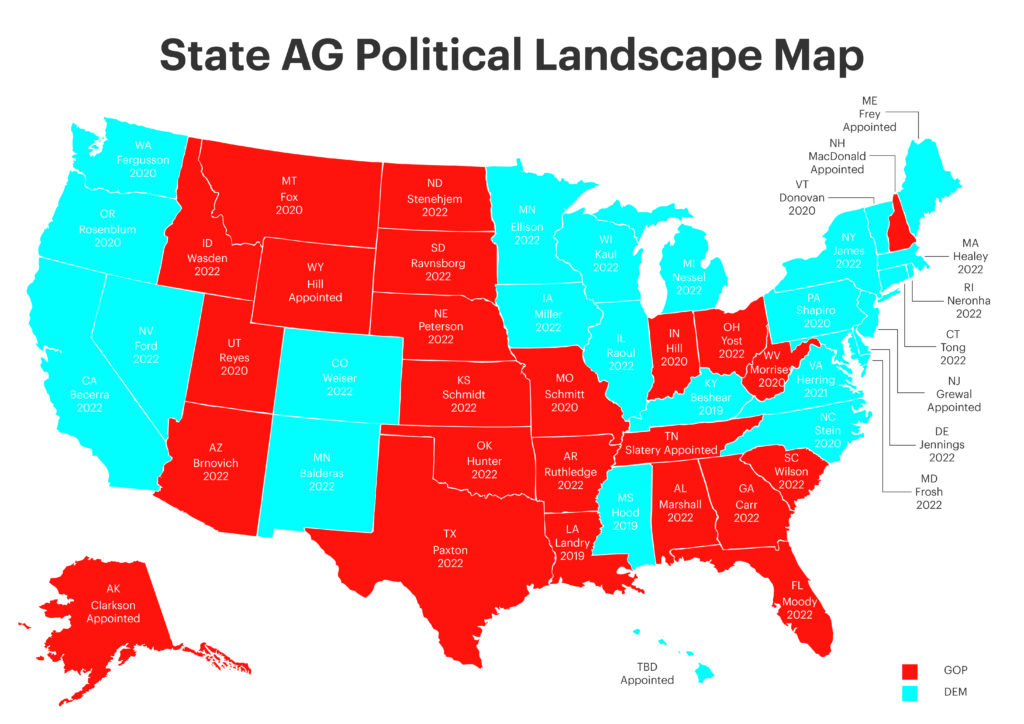Eighteen new state attorneys general will take office in 2019. There will be new AGs in Alaska, Colorado, Connecticut, Delaware, Florida, Hawai`i, Illinois, Maine, Michigan, Minnesota, Missouri, Nevada, New York, Ohio, Rhode Island, South Dakota, Wisconsin and Wyoming. Politically speaking, the impact of the 2018 midterm elections on the AG landscape was decidedly mixed, with Democrats flipping four AG seats previously held by Republicans, and the GOP maintaining their strongholds in Florida and Ohio. Overall, the midterms shifted the balance of state AG seats nationwide to a Democratic majority. Democrats now occupy 27 AG seats (including in Washington, DC) and Republicans, 24.

Companies should be aware that the newly elected AGs are expected to be as aggressive, or more so, than their predecessors. In Connecticut, for example, AG William Tong is succeeding AG George Jepsen, who led some of the largest bipartisan multistate investigations, including into opioid manufacturing and distribution, alleged price fixing in the generic drug market, and data privacy issues. Tong has signaled his intention to continue with these efforts, recently declaring: “I’ve always been activist in the legislature and I’m going to be activist as an attorney general because that’s what you need right now.”[
Other new AGs have started identifying their enforcement priorities. Some newly elected Democratic AGs have announced plans to investigate President Trump’s various business organizations. Others are targeting the administration’s policies. Illinois AG Kwame Raoul is challenging a recent ruling by a federal judge in Texas striking down the Affordable Care Act[, while Nevada AG Aaron Ford has indicated that he will reverse the course set by his predecessor, Republican Adam Laxalt, a staunch opponent of the ACA.
In Colorado, AG Phil Weiser, a Democrat, has outlined his intention to join a lawsuit against opioid manufacturers for allegedly misleading users as to the drugs’ addictive qualities, defend against federal overreach Colorado’s right to decide how it legislates and manages marijuana use, and protect consumers against financial scams. Minnesota AG Keith Ellison, a former Democratic congressman from the state’s 5th District, has pledged to address drug-pricing issues and allegations of anti-competitive activity in the nation’s agricultural sector. “We want to stand with Minnesotans against the big entities in this world as you are trying to make a go in this economy,” he recently told his constituents. “The middle class, I believe, is hanging on barely, and I think the attorney general ought to stand up against the fraudsters, against the monopolies, against these folks who would make your life so much more difficult to afford.”
New elected Republican AGs, for their part, are expected to continue their party’s stalwart defense of the Trump administration through the filing of amicus briefs in high-profile lawsuits challenging his executive orders and final agency actions. But they will also ramp up state enforcement actions in certain areas. For example, Ohio Republican AG Ted Yost is expected to continue his scrutiny of pharmacy benefit managers (PBMs), an industry that he focused on during his time as Ohio State Auditor.
State attorneys general will continue to combine their resources in an ever-growing number of multistate and multi-defendant investigations and civil and criminal enforcement actions, raising the stakes for both individual companies and entire industries. In addition to the issues the AGs campaigned on in the midterm elections, there’s no telling what new issues they will involve themselves in, given the unpredictability of the Trump administration. More relevant to assessing and addressing a business’s regulatory risks is understanding the scope of a particular AG’s authority, its level of activity and the political dynamics framing its choices.



